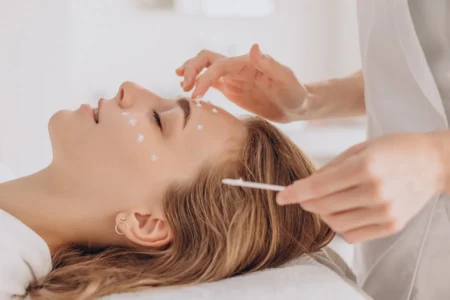 There was a time when “anti-aging” sounded like science fiction.
There was a time when “anti-aging” sounded like science fiction.
Now it’s Tuesday.
From laser treatments to collagen boosters, from non-invasive lifts to personalized skincare based on DNA — medicine has quietly taken over beauty. And the line between health and aesthetics has all but disappeared.
The modern idea of beauty isn’t about vanity anymore. It’s about longevity — looking as good as you feel, and feeling better because you look good.
The Science of Staying Young
Beauty used to be luck. Now it’s chemistry, biology, and precision.
Today’s aesthetic medicine doesn’t chase perfection; it restores balance. Doctors study how skin cells age, how collagen breaks down, and how muscles shift over time. Treatments like micro-needling, fillers, and radiofrequency don’t just mask age — they teach the skin to heal itself.
The goal isn’t to freeze time. It’s to make time move gracefully.
In a world where stress, screens, and pollution age us faster than ever, that’s not indulgence — it’s maintenance.
The Era of Subtle Change
If you think “cosmetic procedure” means a frozen face, you haven’t seen what’s happening now.
Modern aesthetics is all about subtlety. Light touch-ups, natural contours, refreshed skin — the kind of beauty that looks like good sleep and healthy habits, not surgery.
People want to look like themselves, just… brighter. And the best practitioners make sure no one can tell what you’ve done — only that you somehow look better.
Because real progress in beauty isn’t about transformation; it’s about precision.
From Fear to Self-Care
It’s fascinating how public attitude has changed.
A decade ago, people whispered about Botox. Now, it’s as normal as going to the gym.
The shift isn’t just cultural — it’s psychological. Taking care of your face or body used to feel like vanity; now it feels like self-respect.
We finally understand that confidence has chemistry. When you like what you see in the mirror, you move differently, speak differently, live differently.
Medicine didn’t just give people tools to look younger — it gave them permission to feel good about wanting it.
The Inside-Out Connection
Here’s what the smartest beauty clinics now understand: you can’t separate the body from the face.
Skin health reflects gut health, hormones, sleep, and stress. A glowing face without inner balance is short-lived. That’s why aesthetic medicine is slowly merging with nutrition, psychology, and wellness.
Doctors talk about cortisol levels as often as skincare routines. Vitamin infusions, IV drips, and tailored supplements have become part of the beauty plan — because youthfulness starts at the cellular level, not at the mirror.
Beauty, it turns out, isn’t a surface. It’s a system.
Technology Is the New Makeup
Where creams once promised miracles, now lasers, ultrasound, and regenerative medicine deliver them.
LED therapy stimulates collagen. PRP — platelet-rich plasma — uses your own blood to rejuvenate skin naturally. Stem-cell research is paving the way for treatments that don’t just slow aging but reverse its visible signs.
We’re living in the first era where “looking younger” isn’t wishful thinking — it’s biology meeting innovation.
But even the best tech can’t replace one thing: a healthy lifestyle. Sleep, hydration, diet, and movement still write most of the story your face tells.
The Bottom Line
Modern beauty isn’t about denying age — it’s about redefining it.
Medicine has given us tools to look younger, but the real evolution is in how we think. We’ve moved from chasing perfection to pursuing vitality, from hiding flaws to celebrating self-care.
Getting “work done” no longer means pretending to be someone else. It means taking control of how you show up in the world.
Because in the end, beauty isn’t about turning back time — it’s about learning to live in it beautifully.
Picture Credit: Freepik
